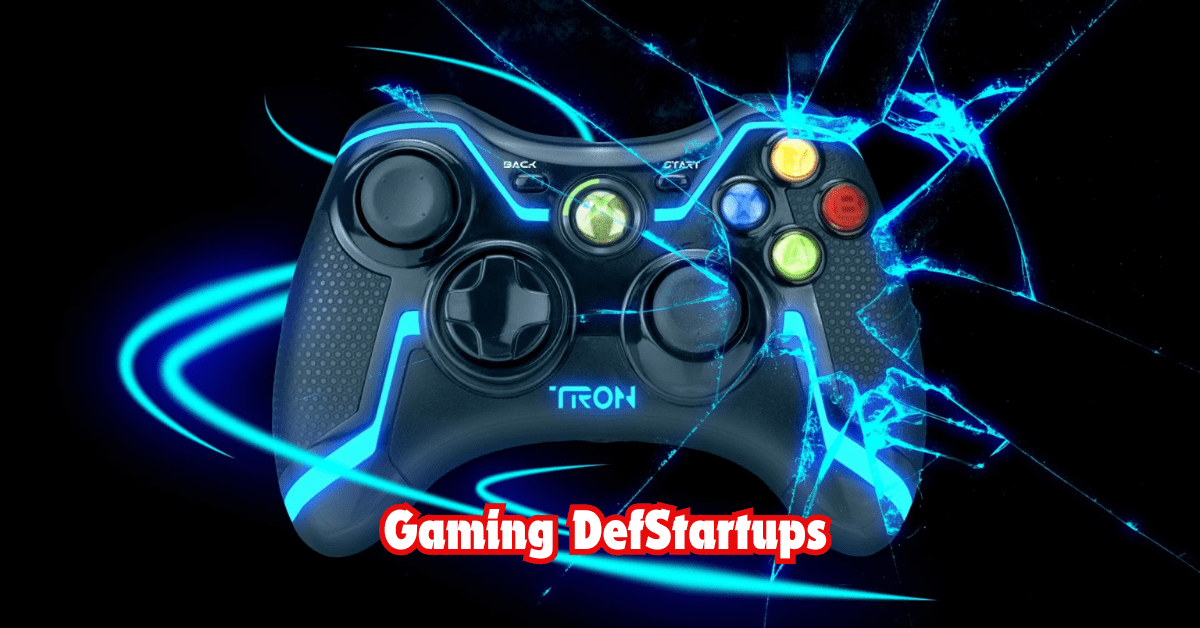1. Introduction to Gaming DefStartup
Gaming DefStartups are revolutionizing the digital entertainment landscape. These innovative startups leverage cutting-edge technologies to create immersive gaming experiences. The rise of DefStartups in the gaming industry highlights their potential to drive significant advancements and reshape how games are developed, distributed, and played. This section provides an overview of the importance and potential impact of Gaming DefStartups, setting the stage for a deeper exploration of their role in the future of digital entertainment.
2. The Role of AI in Transforming Gaming
Artificial Intelligence (AI) is a game-changer in the gaming industry. It enhances game design and player experiences by enabling smarter NPCs, adaptive gameplay, and personalized gaming experiences. AI-driven innovations like procedural content generation and realistic character interactions make games more engaging and dynamic. This section explores how AI is revolutionizing the gaming landscape, providing examples of its transformative impact on game development and player engagement.
3. Key Areas of Innovation and Funding Sources for Gaming DefStartups
Key Areas of Innovation
Artificial Intelligence (AI)
AI is driving significant innovation in gaming by creating more responsive and intelligent in-game characters, enhancing player experience through adaptive learning, and automating complex game development processes. Examples include AI-driven procedural content generation, which creates vast, unique game worlds, and machine learning algorithms that personalize gameplay based on player behavior.
Blockchain Technology
Blockchain ensures security and transparency in gaming transactions. It enables the creation of decentralized gaming platforms where players truly own in-game assets. Blockchain technology also facilitates secure and transparent reward systems, digital rights management, and the creation of non-fungible tokens (NFTs) that can be traded or sold.
Virtual and Augmented Reality (VR/AR)
VR and AR technologies are transforming the gaming experience by creating immersive environments that blur the line between the virtual and real worlds. VR offers fully immersive game worlds, while AR overlays digital elements onto the physical world, enhancing interactive gameplay. Innovations in this area include more affordable and accessible VR headsets and AR mobile apps.
Cloud Gaming
Cloud gaming allows players to stream games over the internet without the need for high-end hardware. This technology democratizes access to high-quality gaming experiences and enables seamless updates and cross-platform play. Key innovations include improved latency, expanded game libraries, and integration with various devices.
eSports and Competitive Gaming
The rise of eSports has turned competitive gaming into a global phenomenon. Innovations in this space include advanced streaming technologies, enhanced spectator experiences, and the development of sophisticated platforms for organizing and broadcasting tournaments. These innovations are supported by growing investment in eSports infrastructure and talent development.
Funding Sources for Gaming DefStartup
Venture Capital (VC)
Venture capital is a primary source of funding for gaming startups. VCs provide substantial financial resources in exchange for equity, helping startups scale quickly. Successful gaming companies often attract significant VC interest due to the high growth potential of the industry.
Crowdfunding
Crowdfunding platforms like Kickstarter and Indiegogo allow startups to raise funds directly from their target audience. This approach not only provides capital but also validates the market demand for a game concept. Successful crowdfunding campaigns can build a dedicated community of early adopters and supporters.
Angel Investors
Angel investors are high-net-worth individuals who invest their personal funds into promising startups in exchange for equity. These investors often provide not just capital, but also mentorship and industry connections, helping startups navigate early-stage challenges.
Government Grants and Subsidies
Various governments offer grants and subsidies to promote innovation in the tech and gaming sectors. These funds can help startups cover development costs, conduct research, and expand their operations without diluting ownership. Applying for and securing these grants often requires meeting specific criteria and demonstrating potential for significant impact.
Corporate Sponsorship and Partnerships
Large corporations may sponsor gaming startups or enter into strategic partnerships. These collaborations can provide startups with essential resources, such as funding, technology, and market access, while allowing corporations to innovate and stay competitive in the gaming space.
This section provides an in-depth look at the key areas of innovation driving the gaming industry forward and the diverse funding sources available to Gaming DefStartups. By leveraging these innovations and securing the right funding, startups can position themselves at the forefront of digital entertainment.
4. Setting Up Your Gaming DefStartup: A Comprehensive Guide
Setting up a Gaming DefStartup involves several crucial steps to ensure success in the competitive gaming industry. This comprehensive guide breaks down the process into manageable steps, guiding entrepreneurs through each stage of building their startup from ideation to scaling.
Step 1: Ideation and Concept Development
- Brainstorming innovative game concepts and defining the unique value proposition of your startup.
Step 2: Business Planning
- Developing a comprehensive business plan outlining your startup’s goals, target market, revenue model, and competitive strategy.
Step 3: Legal and Administrative Setup
- Registering your business entity, obtaining necessary licenses and permits, and ensuring compliance with relevant regulations.
Step 4: Building Your Team
- Assembling a talented and diverse team of professionals with expertise in game development, marketing, finance, and other key areas.
Step 5: Technology and Development
- Selecting the right technology stack and development tools for your game, and executing the development process efficiently.
Step 6: Funding
- Exploring various funding sources such as venture capital, crowdfunding, angel investors, and government grants to secure the necessary capital for your startup.
Step 7: Marketing and Launch
- Developing a strategic marketing plan to build anticipation for your game and executing a successful launch campaign to attract players.
Step 8: Growth and Scaling
- Monitoring key metrics, gathering player feedback, and iterating on your game to drive growth and scale your startup effectively.
By following this guide, aspiring Gaming DefStartup founders can navigate the complexities of starting a gaming company and increase their chances of success in the dynamic and rapidly evolving gaming industry.
5. Choosing the Right Gaming Platform for Your DefStartup
Selecting the appropriate gaming platform is crucial for the success of your DefStartup. This section provides insights into different gaming platforms available and factors to consider when making your choice.
Understanding Different Gaming Platforms
- PC: Offers flexibility and high performance but requires powerful hardware.
- Consoles (Xbox, PlayStation, Nintendo): Provides a dedicated gaming experience with exclusive titles but may have limitations in terms of customization.
- Mobile (iOS, Android): Accessible to a large audience but may face challenges with monetization and discoverability.
- Web/HTML5: Enables cross-platform compatibility and easy distribution but may have limitations in terms of performance.
- Virtual Reality (VR): Immersive gaming experience but requires specialized hardware and may have a limited audience.
Factors to Consider When Choosing a Platform
- Target Audience: Understand the demographics and preferences of your target audience to choose a platform that aligns with their preferences.
- Game Genre and Style: Different platforms cater to different types of games, so choose one that best suits the genre and style of your game.
- Development Resources and Budget: Consider the resources and budget available for game development, as some platforms may require more investment than others.
- Monetization Strategy: Evaluate the monetization options available on each platform and choose one that aligns with your revenue goals.
- Distribution and Market Access: Assess the platform’s reach and distribution channels to ensure your game reaches the desired audience effectively.
By carefully considering these factors, you can make an informed decision about the gaming platform that best suits your DefStartup and maximizes its chances of success in the competitive gaming market.
6. Blockchain: Ensuring Security and Transparency
Blockchain technology is revolutionizing the gaming industry by providing solutions for security, transparency, and ownership of in-game assets. This section explores how blockchain is transforming the gaming landscape and ensuring a secure and transparent environment for players and developers alike.
Role of Blockchain in Gaming Security
- Blockchain technology offers robust security features, including decentralized storage and encryption, protecting player data and transactions from unauthorized access and cyber threats.
Ensuring Transparency in Gaming
- By recording all transactions on a public ledger, blockchain ensures transparency in gaming operations, including item trading, reward distribution, and game outcomes, fostering trust among players and developers.
Ownership of In-Game Assets
- Blockchain enables true ownership of in-game assets by allowing players to have verifiable ownership rights and transferability of digital items outside of the game environment, creating new opportunities for asset monetization and player-driven economies.
Applications of Blockchain in Gaming
- Blockchain technology is being utilized in various gaming applications, including decentralized gaming platforms, non-fungible tokens (NFTs), and blockchain-based marketplaces, revolutionizing how games are developed, distributed, and monetized.
By leveraging blockchain technology, gaming DefStartups can enhance security, transparency, and player engagement, driving innovation and growth in the rapidly evolving gaming industry.
7. Immersive Technologies: VR and AR
Virtual Reality (VR) and Augmented Reality (AR) are transforming the gaming experience, offering players immersive and interactive environments. This section explores the advancements in VR and AR technologies, their impact on gaming, and the potential for innovation within the gaming industry.
Advancements in VR and AR Technologies
- VR technology immerses players in virtual worlds, allowing for realistic and immersive gaming experiences.
- AR overlays digital elements onto the real world, blending virtual and physical environments seamlessly.
Impact on Gaming Experience
- VR and AR technologies enhance gameplay by providing more immersive and interactive experiences, increasing player engagement and enjoyment.
- These technologies enable new gameplay mechanics and storytelling techniques, pushing the boundaries of traditional gaming experiences.
Future Opportunities for Innovation
- The continued advancement of VR and AR technologies presents new opportunities for innovation within the gaming industry.
- Developers can explore new genres, gameplay mechanics, and narrative experiences that leverage the unique capabilities of VR and AR.
By embracing VR and AR technologies, gaming DefStartups can create compelling and unforgettable gaming experiences that captivate players and drive innovation in the industry.
8. Community-Driven Game Development
Community involvement plays a crucial role in shaping the success of gaming DefStartups. This section delves into the importance of community feedback and engagement in game development, as well as strategies for building and nurturing a strong gaming community.
Importance of Community Feedback
- Community feedback provides valuable insights into player preferences, helping DefStartups refine game mechanics, balance, and overall player experience.
- Engaging with the gaming community fosters a sense of ownership and loyalty among players, driving long-term engagement and retention.
Strategies for Building a Gaming Community
- Establishing an online presence through social media, forums, and gaming communities to connect with players and solicit feedback.
- Hosting events, tournaments, and live streams to engage with the community and build excitement around game releases.
- Creating opportunities for player involvement, such as beta testing, user-generated content, and community-driven development initiatives.
By prioritizing community-driven game development, DefStartups can build a dedicated and passionate player base that supports their growth and success in the competitive gaming market.
9. Challenges and Future Prospects
Gaming DefStartups face various challenges in navigating the competitive gaming industry. This section examines common obstacles and future prospects for DefStartups, providing insights into the dynamic landscape of the gaming market.
Common Challenges Faced by defstartup tech games
- Competition: DefStartups must contend with established gaming companies and emerging competitors vying for market share and player attention.
- Monetization: Developing sustainable monetization strategies amidst changing player preferences and industry trends can be challenging for DefStartups.
- Technical Complexity: Creating high-quality games requires expertise in game design, development, and optimization, posing technical challenges for DefStartups, especially those with limited resources.
- Marketing and Visibility: Standing out in a crowded market and reaching target audiences effectively require strategic marketing efforts and effective distribution channels.
Future Trends and Opportunities
- Continued Growth: The gaming industry is expected to continue growing, driven by technological advancements, increasing demand for immersive experiences, and the rise of new gaming platforms and business models.
- Emerging Technologies: Innovations in AI, VR, AR, and blockchain present new opportunities for DefStartups to differentiate themselves and create unique gaming experiences.
- Community Engagement: Building strong, engaged gaming communities will become increasingly important for DefStartups to drive player retention, loyalty, and advocacy.
- Diversity and Inclusion: DefStartups that prioritize diversity and inclusion in their games and teams can tap into underserved markets and foster a more inclusive gaming culture.
Despite the challenges, gaming DefStartups have significant opportunities for growth and innovation in the evolving gaming landscape. By addressing common obstacles and embracing emerging trends, DefStartups can position themselves for success in the dynamic and competitive gaming industry.
10. Conclusion: defstartup tech games
In conclusion, the emergence of Gaming DefStartups represents a significant shift in the digital entertainment landscape. These startups leverage cutting-edge technologies such as AI, blockchain, and VR/AR to create innovative and immersive gaming experiences. By addressing key areas of innovation, securing funding, and embracing community-driven development, DefStartups can position themselves for success in the competitive gaming market. Despite challenges, the future looks promising for Gaming DefStartups, with opportunities for growth, innovation, and continued expansion in the dynamic gaming industry.



